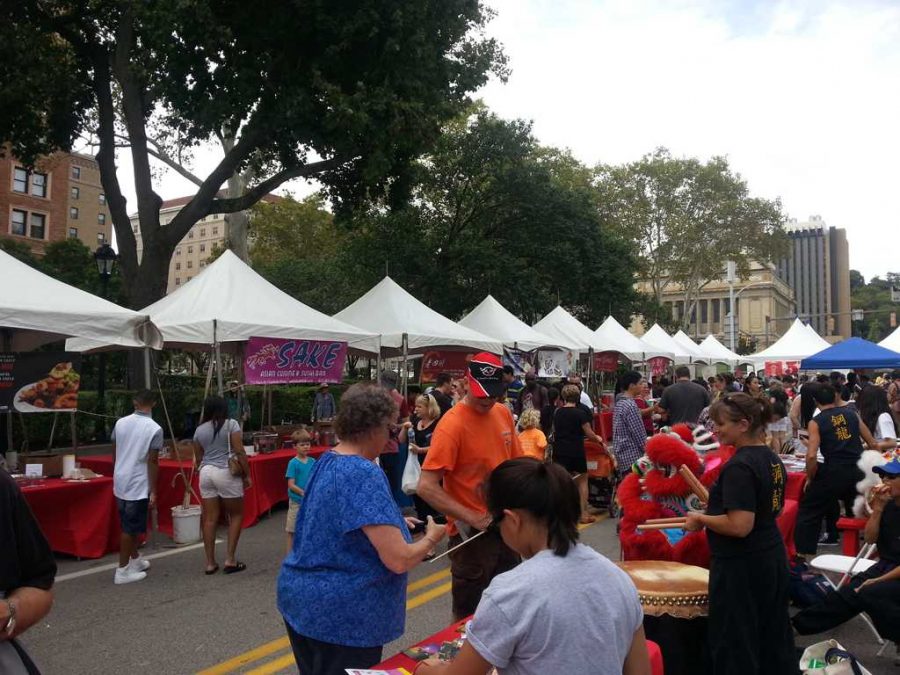With lacquered lips and vintage high heels, 10 Chinese models clad in traditional cheongsams used Bigelow Boulevard as their cat walk this weekend.
The fashion show was one of the highlights of the inaugural Pittsburgh Chinese Cultural Festival. The festival’s organizers wanted the event to promote Chinese culture in Pittsburgh and bring the members of the Chinese community together, according to Dequan Jiao, the president of the Chinese Association for Science and Technology Pittsburgh Chapter (CAST-P), one of the groups that organized the event. The festival featured a grand stage for performances, 27 individual booths for cultural products and educational booths from the festival’s organizers. The Chinese government helped with the planning of this event and sponsored an art exhibit booth at the festival.
Along Bigelow Boulevard between Fifth Avenue and Forbes Avenue Saturday from 11 a.m. to 6 p.m., visitors watched martial arts displays, Peking Opera, a type of Chinese opera, oral rhymes and soloists playing on zithers — stringed instruments that are ancestors of the guitar.
“Our festival has a dual mission — first, to bring unity to the fast-growing Chinese community in Pittsburgh, and second, to promote Chinese culture in the city of Pittsburgh,” Jiao said.
Attendees relished the array of food from local Chinese restaurants, including Little Asia in Oakland, Sichuan Gourmet in Squirrel Hill and Jimmy Wan’s in Fox Chapel. Although attendees had to pay to try the authentic cuisine, the rest of the event was free. Against the serene, five-tone melody of the zithers in the background, the crowd whistled and applauded — some in Chinese and others in English.
The festival’s organizers included CAST-P, Pittsburgh Academy of Chinese Culture and Language, Pitt’s Confucius Institute, and Pittsburgh Chinese Church.
The organizers chose the date of the event in anticipation of the Mid-Autumn Festival on Sept. 27, the second-most celebrated festival in China. Another Mid-Autumn Festival was hosted by the Pittsburgh Chinese Social Group on the same day in North Park pavilion.
With the rising Chinese population in Pittsburgh, a celebration for this festival seemed necessary to the event’s organizers.
Currently, about 4.4 percent of Pittsburgh’s population are of Asian descent, according to the 2010 U.S. Census. The same report showed a 134 percent increase in college-aged Chinese students living in the Pittsburgh area. At Pitt, 1,709 undergraduate students are of Asian descent, according to Pitt’s 2015 Fact Book.
Jiao said around 4,000 people attended the day-long event. He was delighted that the organizations’ 11 months of planning and $39,000 investment from partners, sponsors, vendors and cultural exhibitors in the project paid off with such a great turnout.
Lillie Rana, a senior majoring in Chinese, was most drawn to the demonstration of Tai Chi, a slow-paced form of martial arts.
“Tai Chi is something that I feel a lot of people know about but don’t have a lot of experience with, so it was a good way to introduce it to them,” Rana said.
Other groups, such as Steel Dragon, a Pittsburgh-based dragon and lion dance troupe, also brought their acts to life with a red and gold cloth lion that constantly provoked and winked at the audience as it leaped and shimmied to a boisterous drumbeat.
For Yuzhe Bai, a fifth year biology major, the food display was most appealing, and Little Asia’s spread caught his eye.
“Little Asia’s rou jia mo is probably the most popular here. As you can see, there is always a line here,” Bai said as he stood in line.
Besides rou jia mo, a stewed meat sandwich that contains more than 20 different spices, booths offered lamb skewers, pork and chive dumplings and bubble tea. Although there were four different flavors on the festival’s bubble tea menu, the company was not prepared for the number of people that attended the festival and often only had one flavor available.
“We totally underestimated how much food students eat. Now we just keep running out of food,” Guanguang Ji, the president of PACCL, said .
Unlike the snacks, students largely avoided the Chinese artworks that antique vendors sold — where some Jade bracelets went for hundreds of dollars.
Among the art booths, crowds favored an exhibition booth of handcrafted embroidery, papercutting and dough figurines, sponsored by the Chinese government. The Pittsburgh government invited Chinese folk artists straight from Wuhan, Pittsburgh’s sister city in China since 1982. The two cities collaborate on arts and education, urban transformation, innovation and sustainable development ideas, according to Mayor Peduto’s website. The folk artists demonstrated to the audience how to embroider, cut paper and make dough figurines in real time.
Ji, who is in his 70s, dedicated much of his retired life to building a tight-knit Chinese community in Pittsburgh. He recruited more than 80 students from Pitt, CMU and some local high schools as volunteers for the event.
After immigrating to the United States more than two decades ago, Ji said he has a lesson or two to teach young Chinese students here.
“We Chinese sometimes victimize ourselves. We tend to dwell on the fact that we are the minority. We think we don’t fit in,” Ji said. “But … we need to let others see the good in Chinese culture. This festival is exactly what we need to empower the Chinese in Pittsburgh, to empower them to claim ownership over the city that they live in and love deeply. ”



